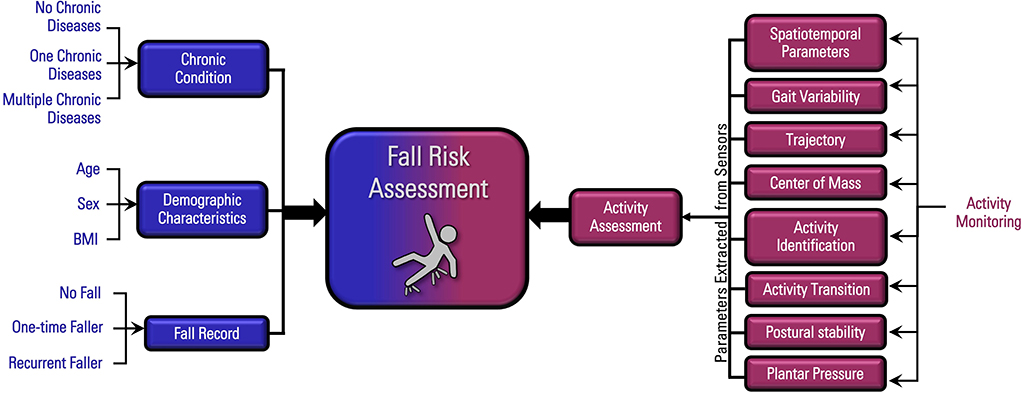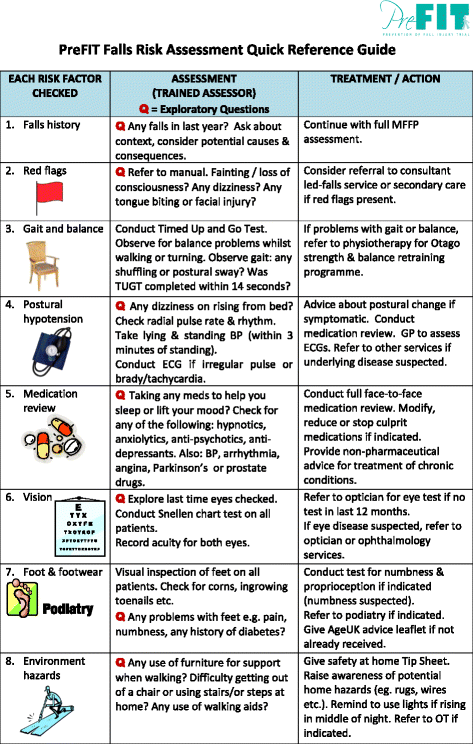The Best Guide To Dementia Fall Risk
Table of ContentsHow Dementia Fall Risk can Save You Time, Stress, and Money.7 Easy Facts About Dementia Fall Risk ShownThe Definitive Guide to Dementia Fall RiskThe Only Guide for Dementia Fall RiskThe smart Trick of Dementia Fall Risk That Nobody is Talking About
Make certain that there is a designated location in your clinical charting system where staff can document/reference scores and document appropriate notes connected to drop prevention. The Johns Hopkins Autumn Risk Evaluation Tool is one of numerous tools your team can use to aid prevent adverse medical events.Client drops in hospitals prevail and incapacitating adverse occasions that linger despite decades of initiative to lessen them. Improving communication throughout the evaluating registered nurse, treatment team, patient, and patient's most entailed loved ones may enhance loss prevention initiatives. A team at Brigham and Women's Healthcare facility in Boston, Massachusetts, sought to create a standardized loss prevention program that centered around improved communication and person and household interaction.

The technology team emphasized that effective application depends on client and staff buy-in, assimilation of the program into existing workflows, and integrity to program processes. The team kept in mind that they are facing how to make sure continuity in program execution throughout periods of crisis. During the COVID-19 pandemic, for instance, an increase in inpatient falls was related to limitations in patient interaction together with limitations on visitation.
Indicators on Dementia Fall Risk You Should Know
These events are commonly thought about preventable. To implement the treatment, organizations require the following: Accessibility to Autumn pointers sources Loss suggestions training and retraining for nursing and non-nursing staff, consisting of new registered nurses Nursing process that enable client and family engagement to carry out the drops analysis, guarantee use the avoidance plan, and carry out patient-level audits.
The outcomes can be highly damaging, typically accelerating patient decrease and creating longer health center keeps. One research study approximated keeps boosted an extra 12 in-patient days after a person autumn. The Loss TIPS Program is based upon appealing clients and their family/loved ones across three main procedures: evaluation, personalized preventative interventions, and bookkeeping to make sure that patients are participated in the three-step fall avoidance procedure.
The patient assessment is based upon the Morse Loss Scale, which is a validated fall threat assessment device for in-patient hospital setups. The range includes the six most usual reasons people in hospitals drop: the individual autumn background, high-risk problems (including polypharmacy), usage of IVs and other external devices, mental standing, stride, and mobility.
Each threat variable relate to several actionable evidence-based interventions. The nurse develops a plan that incorporates the treatments and is noticeable to the care group, individual, and household on a laminated poster pop over to this web-site or published aesthetic aid. Registered nurses establish the plan while fulfilling with the client and the individual's family members.
Some Known Facts About Dementia Fall Risk.
The poster acts as a communication tool with other participants of the patient's treatment team. Dementia Fall Risk. The audit part of the program consists of evaluating the patient's knowledge of their risk elements and avoidance strategy at the unit and hospital levels. Registered nurse champs conduct a minimum of five private interviews a month with people and their families to examine for understanding of the loss prevention strategy

A projected 30% of these drops result in injuries, which can range in intensity. Unlike other damaging occasions that require a standardized clinical response, autumn prevention depends highly on the requirements of the client. Including the input of individuals that know the person finest enables for better customization. This method has actually verified to be more effective than fall prevention programs that are based primarily on the production of a danger rating and/or are not personalized.
Everything about Dementia Fall Risk

Based on auditing outcomes, one website had 86% compliance and two websites had over 95% conformity. A cost-benefit evaluation of the Autumn TIPS program in 8 medical facilities approximated that the program cost $0.88 per individual to apply and led to financial savings of $8,500 per 1000 patient-days in direct expenses associated with the avoidance of 567 falls over three years and see here eight months.
According to the advancement more information group, companies curious about implementing the program should carry out a readiness evaluation and falls prevention voids analysis. 8 Additionally, companies should ensure the necessary facilities and workflows for application and establish an implementation plan. If one exists, the organization's Autumn Prevention Task Force ought to be associated with preparation.
7 Simple Techniques For Dementia Fall Risk
To start, organizations ought to make certain completion of training modules by registered nurses and nursing aides - Dementia Fall Risk. Medical facility personnel should assess, based on the needs of a medical facility, whether to make use of an electronic wellness record hard copy or paper variation of the loss prevention plan. Executing teams must hire and train registered nurse champions and establish processes for auditing and coverage on autumn information
Personnel need to be included in the process of upgrading the process to involve individuals and family members in the evaluation and avoidance plan procedure. Systems should remain in area so that devices can understand why a fall happened and remediate the reason. A lot more specifically, nurses need to have networks to provide ongoing responses to both staff and device management so they can adjust and enhance loss prevention operations and communicate systemic problems.